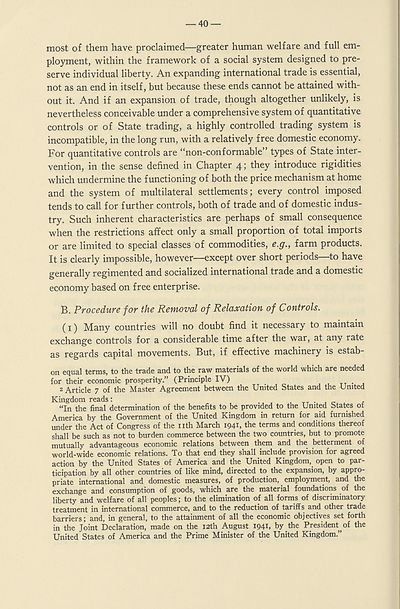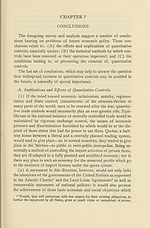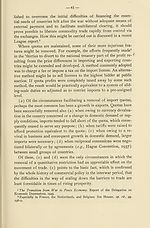Download files
Complete book:
Individual page:
Thumbnail gallery: Grid view | List view

40 —
most of them have proclaimed—greater human welfare and full em¬
ployment, within the framework of a social system designed to pre¬
serve individual liberty. An expanding international trade is essential,
not as an end in itself, but because these ends cannot be attained with¬
out it. And if an expansion of trade, though altogether unlikely, is
nevertheless conceivable under a comprehensive system of quantitative
controls or of State trading, a highly controlled trading system is
incompatible, in the long run, with a relatively free domestic economy.
For quantitative controls are “non-conformable” types of State inter¬
vention, in the sense defined in Chapter 4; they introduce rigidities
which undermine the functioning of both the price mechanism at home
and the system of multilateral settlements; every control imposed
tends to call for further controls, both of trade and of domestic indus¬
try. Such inherent characteristics are perhaps of small consequence
when the restrictions affect only a small proportion of total imports
or are limited to special classes of commodities, e.g., farm products.
It is clearly impossible, however—except over short periods—to have
generally regimented and socialized international trade and a domestic
economy based on free enterprise.
B. Procedure for the Removal of Relaxation of Controls.
(1) Many countries will no doubt find it necessary to maintain
exchange controls for a considerable time after the war, at any rate
as regards capital movements. But, if effective machinery is estab-
on equal terms, to the trade and to the raw materials of the world which are needed
for their economic prosperity.” (Principle IV) tt • j
2 Article 7 of the Master Agreement between the United States and the United
Kingdom reads: . , tt • j c-
“In the final determination of the benefits to be provided to the United States ot
America by the Government of the United Kingdom in return for aid furnished
under the Act of Congress of the nth March 1941, the terms and conditions thereof
shall be such as not to burden commerce between the two countries, but to promote
mutually advantageous economic relations between them and the betterment of
world-wide economic relations. To that end they shall include provision for agreed
action by the United States of America and the United Kingdom, open to par¬
ticipation by all other countries of like mind, directed to the expansion, by appro¬
priate international and domestic measures, of production, employment, and the
exchange and consumption of goods, which are the material foundations oi the
liberty and welfare of all peoples; to the elimination of all forms of discriminatory
treatment in international commerce, and to the reduction of tariffs and other trade
barriers; and, in general, to the attainment of all the economic objectives set forth
in the Joint Declaration, made on the 12th August 1941, by the President of the
United States of America and the Prime Minister of the United Kingdom.”
most of them have proclaimed—greater human welfare and full em¬
ployment, within the framework of a social system designed to pre¬
serve individual liberty. An expanding international trade is essential,
not as an end in itself, but because these ends cannot be attained with¬
out it. And if an expansion of trade, though altogether unlikely, is
nevertheless conceivable under a comprehensive system of quantitative
controls or of State trading, a highly controlled trading system is
incompatible, in the long run, with a relatively free domestic economy.
For quantitative controls are “non-conformable” types of State inter¬
vention, in the sense defined in Chapter 4; they introduce rigidities
which undermine the functioning of both the price mechanism at home
and the system of multilateral settlements; every control imposed
tends to call for further controls, both of trade and of domestic indus¬
try. Such inherent characteristics are perhaps of small consequence
when the restrictions affect only a small proportion of total imports
or are limited to special classes of commodities, e.g., farm products.
It is clearly impossible, however—except over short periods—to have
generally regimented and socialized international trade and a domestic
economy based on free enterprise.
B. Procedure for the Removal of Relaxation of Controls.
(1) Many countries will no doubt find it necessary to maintain
exchange controls for a considerable time after the war, at any rate
as regards capital movements. But, if effective machinery is estab-
on equal terms, to the trade and to the raw materials of the world which are needed
for their economic prosperity.” (Principle IV) tt • j
2 Article 7 of the Master Agreement between the United States and the United
Kingdom reads: . , tt • j c-
“In the final determination of the benefits to be provided to the United States ot
America by the Government of the United Kingdom in return for aid furnished
under the Act of Congress of the nth March 1941, the terms and conditions thereof
shall be such as not to burden commerce between the two countries, but to promote
mutually advantageous economic relations between them and the betterment of
world-wide economic relations. To that end they shall include provision for agreed
action by the United States of America and the United Kingdom, open to par¬
ticipation by all other countries of like mind, directed to the expansion, by appro¬
priate international and domestic measures, of production, employment, and the
exchange and consumption of goods, which are the material foundations oi the
liberty and welfare of all peoples; to the elimination of all forms of discriminatory
treatment in international commerce, and to the reduction of tariffs and other trade
barriers; and, in general, to the attainment of all the economic objectives set forth
in the Joint Declaration, made on the 12th August 1941, by the President of the
United States of America and the Prime Minister of the United Kingdom.”
Set display mode to:
![]() Universal Viewer |
Universal Viewer | ![]() Mirador |
Large image | Transcription
Mirador |
Large image | Transcription
Images and transcriptions on this page, including medium image downloads, may be used under the Creative Commons Attribution 4.0 International Licence unless otherwise stated. ![]()
| League of Nations > Economic and financial section > Quantitative trade controls > (42) |
|---|
| Permanent URL | https://digital.nls.uk/190588539 |
|---|
| Shelfmark | LN.II |
|---|
| Description | Over 1,200 documents from the non-political organs of the League of Nations that dealt with health, disarmament, economic and financial matters for the duration of the League (1919-1945). Also online are statistical bulletins, essential facts, and an overview of the League by the first Secretary General, Sir Eric Drummond. These items are part of the Official Publications collection at the National Library of Scotland. |
|---|---|
| Additional NLS resources: |
|

